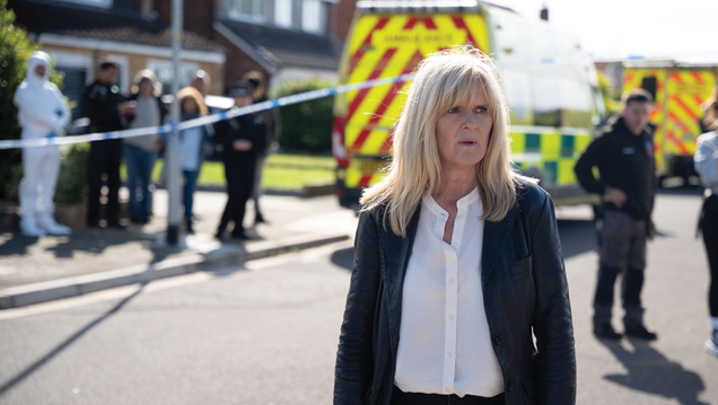Could a contemporary thriller set in Brighton and starring John Simm become ITV’s new Inspector Morse? Matthew Bell investigates.
Grace was shot under stringent coronavirus protocols but you would never know an epidemic was sweeping the nation from watching ITV’s new Sunday-night drama. This was as the broadcaster and the show’s producer intended – and immensely pleasing for its star, John Simm. “No one wants to see anything about Covid. It was the most depressingly boring year and we don’t want to see it on film,” he says.
Simm plays detective superintendent Roy Grace, the eponymous hero of Peter James’s bestselling crime novels.
The actor hadn’t read a Grace novel before being offered the part. “It’s not a genre I would read normally,” he admits. “I devoured the first three very quickly and I was absolutely hooked. I’m on book 10 at the moment.”
Grace can use strange methods, including consulting a medium, but, says Simm, “he’s not maverick – he’s just a really good police officer”.
“In today’s police world, maverick cops don’t have a place,” says James. “In so many television dramas, you see the senior cop being bolshie and shouting at people.
“I’ve been going out with the police on my research for well over 30 years and the really good ones are not shouty – they’re calm, methodical and actually very kind. I look at John on television and he is completely that.”
“We couldn’t get to hang out with the actors – that’s the best bit, right? There’s no point in making drama if you can’t hang out with the stars.”
Brighton, where the novels are set, offers James scope for his imagination to run wild. “Graham Greene has been the only writer who really understood its dark heart. I was born and grew up in Brighton and, as a kid in the 1950s and 1960s, it was a dark, dangerous and seedy place.”
Now, he admits, “it’s one of the coolest places in England”, but the criminals never left. “It’s really fertile ground for me.”
James classes himself a thriller writer, not an author of murder mysteries: “The classic British whodunnit starts with a body on page one and the rest of the novel is a puzzle to solve it, whereas I like to have the victim alive but in peril at the end of chapter one.”
There have been three previous adaptations of Grace novels, all of which James dismisses as “lame”. He has rejected other proposals, including an odd BBC Scotland proposal to relocate Roy and his team to Aberdeen.
For this latest adaptation, he turned to an old friend, actor-turned-producer Andrew O’Connor, the co-founder of Second Act Productions. “He’s somebody I completely trust and who’s always been a fan of my work.”
James passed on adapting his own work: “The average Roy Grace novel is 120,000 words; a script is 20,000 and you’re writing in a very different way. I felt it would be better to let somebody else have it.”
O’Connor approached his old friend Russell Lewis, the creator of Inspector Morse prequel Endeavour and writer of countless episodes of Morse, Lewis, Kavanagh QC and Sharpe. Lewis and O’Connor were child actors and met at acting school in the 1970s.
Lewis is a busy man, performing the herculean task of penning all 30 episodes of Endeavour over the past nine years – but he found the time to adapt the first two Grace novels.
As well as writing 40-plus books, James has produced films and TV shows, enduring “writers with egos the size of planets – and bigger”. He says Lewis couldn’t be more different: “Russ has no ego. He is a genuinely warm, funny, bright guy. He’s been incredibly respectful, and he didn’t need to be, as he’s had an amazing career himself. He’s not changed anything without discussing it with me.”
Lewis talks as warmly about James: “It was a real privilege for me – the guy’s a ledge. Peter was amazingly supportive throughout.
“Peter’s written for the screen before, so he knows that what you can do in a book sometimes doesn’t work the same way on screen. He was completely open to me expanding and developing what was in the novel.”
Over the years, Lewis has put the works of PD James, Bernard Cornwell, Agatha Christie and Colin Dexter on screen, and says the same rules apply to all adaptations: “You want to do right by them and by their creation.”
Production on Grace began early last year from a base at Brighton Racecourse, abruptly stopped as the country went into lockdown and then restarted in early autumn.
“We were one of the first dramas to go back into production,” recalls Paul Sandler, who founded Second Act Productions with O’Connor: “The whole team really pulled together and worked under very difficult and stringent conditions.”
None of the executive producers, who also number James, Lewis and Patrick Schweitzer from Tall Story Pictures, made it on to the set. “Everything had to be done from a distance or not done at all,” says Sandler.
O’Connor recalls: “We couldn’t get to hang out with the actors – that’s the best bit, right? There’s no point in making drama if you can’t hang out with the stars.”
The Covid-19 rules raised the stress levels of the cast. Richie Campbell, who plays Roy Grace’s partner, detective sergeant Glenn Branson, recalls: “I was so nervous. I like a hands-on approach [to acting]… a bit touchy-feely, so to speak, but as [everything] was stripped back, I was wondering if we would be able to create what we [wanted] on screen.”
In the event, the actors coped and then flourished until working within the protocols become “second nature”, says Campbell. Rakie Ayola, who plays assistant chief constable Alison Vosper, adds: “You get beyond the strangeness.”
“I was so happy to see Rakie in that role,” says Campbell, who, like Ayola, is black and part of a diverse cast. “But it was also because I knew she was good for that role; they hadn’t just shoehorned her in. Grace is a very modern show and a good representation of the country.”
“It’s a diverse cast and it should be,” says Simm. “Things are changing for the better, slowly but surely.”
The first of two Grace films, Dead Simple, airs on ITV at 8pm on 14 March; the second, Looking Good Dead, later this year.
Dead Simple features a scene of psychological horror this viewer found almost impossible to watch. This pleases Lewis: “It worked as we meant it to, then.” But there are limits to what dramas can portray in primetime. “Peter’s stories are so deliciously dark,” says executive producer Patrick Schweitzer. “While we haven’t been able to go full on with the blood and guts because of the compliance issues you face with a family [viewing] slot, I think it’s a defining aspect of the show that it has darker subject matter and challenging cases.”
Despite the odd grisly scene, could Grace give ITV another Inspector Morse? Like John Thaw, Simm is a bankable star, and there’s plenty of source material. Peter James’s 17th Grace novel is out in May and he’s already “55 pages in” on number 18.
Does James see Grace becoming a TV institution? “I’d be devastated if it wasn’t,” he says, laughing. “Roy is desperately close to my heart… If we could have a series as long as Morse, I’d be over the moon.”
“It’s for the audience to say and not for us to make that call,” adds Lewis. “You never take anything for granted. It’s a two-hour slot, as was Sharpe, Lewis, Morse and Kavanagh, so it’s going to invite comparisons with those kinds of shows. But, hopefully, it’s very much its own thing. [Grace] is contemporary and the pace is completely different – it’s a roller-coaster ride for the audience. We’d love to do more.”







